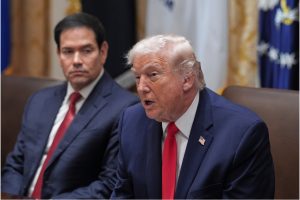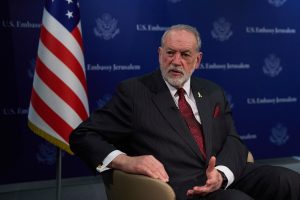
Biden’s ESG: The BlackRock-Davos-UN Agenda Gets Smacked by Congress, States, Markets
Opposition to “woke” ESG corporatism is snowballing, as Joe Biden and Larry Fink found out this past week. Fink is the billionaire CEO of BlackRock, the world’s largest asset manager with $8 trillion under management. He is also one of Biden’s biggest boosters and the most prominent corporate promoter of ESG, the controversial rating system that is pushing companies to adopt “progressive” Soros-style policies rather than carry out their legal and fiduciary responsibilities to their shareholders. ESG, which stands for Environment, Social, and Governance, is a scheme aimed at pressuring businesses into joining the politically correct stampede on climate change, decarbonization, sustainable development, and so-called social justice and racial justice issues such as gun control, abortion rights, LGBTQ equity, and critical race theory.
Belated Rally Against ESG Juggernaut
Although ESG has only hit the general public’s radar screens in the past year or so, the ESG program, like most globalist intrigues, has been quietly in the works for decades. (We will return to that important history in a moment.) However, with the dangers of ESG now far more readily apparent, opposition is belatedly forming. Congress is stepping into the breach. State legislatures, governors, and attorney generals are also taking action.
On Tuesday, February 28, the U.S. House of Representatives fired the first salvo aimed at nixing the administration’s ESG program for 401(k) retirement investing, as put forward by the Biden Labor Department’s new rule, known as the “Prudence and Loyalty in Selecting Plan Investments and Exercising Shareholder Rights.” The Labor rule, crafted pursuant to an executive order by President Biden’s “Executive Order on Climate-Related Financial Risk” (EO 14030) of May 20, 2021, was promulgated to undo President Trump’s executive order banning the ESG impositions on pension funds.
Speaking on the House floor on February 28, Rep. Andy Barr (R-Ky.), the sponsor of the anti-ESG resolution, blasted Democrats for misrepresenting his bill and for failing to protect investors and retirees from the harmful impacts of ESG on their investments. “Nothing in this resolution prohibits an American from allocating their capital from the way they want to,” he noted. But what this resolution will do is stop the Department of Labor from coercing Americans into lower performing, higher fee, less diversified, politicized funds. We must stop the pollicization of allocation of capital…. In 2022, the S&P 500 energy sector ended the year a whopping 59 percent higher than where it started, amid a brutal bear market, in which the S&P 500 overall lost 20 percent! If you’re invested in ESG in 2022, you are a massive loser because you are divested from energy. Stop the pollicization of capital.”
On an almost straight party-line vote, the anti-ESG measure, House Joint Resolution 30, passed by 216 to 204. Representative Jared Golden of Maine was the sole Democrat to join the Republicans on this vote in the House. The following day, March 1, it passed the Senate by a vote of 50 to 46, with Democratic Senators Jon Tester of Montana and Joe Manchin of West Virginia crossing over to vote with the Republicans.
To dump the ESG rule, Republicans utilized the Congressional Review Act, which lets Congress disapprove — by a simple majority vote — a final rule issued by a federal agency if it has not been in effect for more than 60 legislative days. The White House press office says President Biden is preparing to use his veto pen for the first time to cancel this legislation and keep his ESG plan in place.
As we have reported here at The New American (see articles linked below), more than two dozen states are suing the Biden administration over the ESG rule and states are divesting from BlackRock, Vanguard and other asset managers that are pushing ESG.
Long, Dark History of the ESG Stealth Agenda
The foundation for ESG was laid more than 30 years ago by the Business Council for Sustainable Development (BCSD) at the 1992 Earth Summit. For that UN confab in Rio de Janeiro, the BCSD effected a carefully timed release for its book entitled, Changing Course: A Global Perspective on Development and the Environment. Accompanied by the scripted hosannahs of the global press, it introduced much of the world to “responsible investing,” by which was meant a new form of “capitalism” with an enviro-socialist twist. (For more history on this, see the author’s 1992 book, Global Tyranny, Step by Step: The United Nations and the Emerging New World Order.) The next major step came in 1999, when then UN Secretary-General Kofi Anna went to the World Economic Forum’s annual Davos extravaganza to announce the UN’s Global Compact as a means to promote “responsible business practices and UN values among the global business community.” It claimed the support of thousands of companies, business executives, and “stakeholders” (i.e., paid activists). The following year, 2000, the UN held its Millennium Summit in New York City, which resulted in the Millennium Development Goals (MDGs). The MDGs were an attempt to implement piecemeal the UN’s massive, 351-page Agenda 21 – unveiled at the Rio Earth Summit — in a simplified, digestible program of 8 goals, 18 targets and 48 indicators. More woke corporatists signed onto the MDGs, which, we were told, would bring about global nirvana by 2015. But, as we found out when 2015 came along, the UN-WEF globalists simply upped the ante, replacing the 8 Millennium Development Goals (MDGs) with the 17 Sustainable Development Goals (SDGs).
From MDGs to SDGs and ESG
The new 17 SDGs also included an associated 169 targets and 232 indicators, all of which would guide humanity to the newly revised global nirvana by 2030. So promised the benevolent one-world technocrats. One such technocrat is Columbia University Professor Jeffrey Sachs (UN Special Advisor, George Soros acolyte, WEF Agenda Contributor, Council on Foreign Relations member) who penned an influential propaganda piece entitled, “From Millennium Development Goals to Sustainable Development Goals” for the prestigious British medical journal, The Lancet, in 2012, to introduce the idea of transition from the MDGs to the more detailed SDGs.
There were a couple of additional intermediate steps that deserve mention. What came to be known as ESG — a critical component of the Agenda 21/Agenda 2030 MDGs/SDGs — began in 2003 at the Geneva-based United Nations Environmental Program Financial Initiative (UNEP FI) under the leadership of British UN bureaucrat Paul Clements-Hunt and Australian James Gifford, a former enviro-activist with the Wilderness Society. The Clements-Hunt/Gifford team at UNEP FI developed what has become a network of financial institutions and corporations under the umbrella of the United Nations Principles for Responsible Investment (UNPRI).
The UNPRI, working closely with the WEF and its affiliated corporations, is a prime driver of ESG. The UNPRI website says the organization “is the world’s leading proponent of responsible investment. It works:
- to understand the investment implications of environmental, social and governance (ESG) factors;
- to support its international network of investor signatories in incorporating these factors into their investment and ownership decisions.”
As noted above, the BlackRock behemoth and its CEO Larry Fink are leading promoters of ESG — and globalization. In the video below, we see Fink at the January 2023 WEF summit in Davos speaking out against “fragmentation,” which is a globospeak denunciation of those peoples and nations who desire to keep their national sovereignty.
As can be seen in the video in the Yahoo!Finance link here, Fink proudly boasts: “I’m a globalist.” That is no surprise to anyone who has observed the longtime Fink/Blackrock support for the UN SDGs, UN Global Compact, UNPRI, etc.
The BlackRock-Biden Connection
BlackRock has an outsized footprint in the Biden administration, with former top executives of the firm in key Biden posts and former Obama-Biden officials now rotating into top slots at BlackRock.
Brian Deese, the former Global Head of Sustainable Investing at BlackRock and a former senior advisor to President Obama, was named to head Biden’s National Economic Council.
Wally Adeyemo, former chief of staff to Larry Fink at BlackRock and former president of the Obama Foundation is Biden’s deputy secretary of the Treasury, under Janet Yellen.
Mike Pyle, a chief investment strategist for BlackRock and an advisor to President Obama and Hillary Clinton, was picked to be Vice President Kamala Harris’s chief economist.
Thomas Donilon, a national security advisor in the Obama-Biden administration, is currently chairman of BlackRock’s research business.
Dalia Osman Blass, a former SEC official, is now BlackRock’s chief of external affairs.
BlackRock is also a big player when it comes to political contributions, setting a new record in the 2022 midterm elections.
BlackRock, Vanguard, Goldman Sachs, JPMorgan Chase
BlackRock’s influence on ESG is amplified by other financial giants that have also jumped on the ESG bandwagon, such as Vanguard, State Street, Goldman Sachs, and JPMorgan Chase, to name but a few. An important tie these corporate titans have in common is participation in the World Economic Forum, the premier globalist organization that has been promoting ESG for years.
The WEF globalists see ESG as a crucial element of The Great Reset, their Luciferian plan to play god and “reset” all of humanity: politically, economically, socially, biologically, morally, and spiritually. Of course, the World Economic Forum is an official “Strategic Partner” of the United Nations, so it should be no surprise that the WEF openly admits that ESG is a system to boost the UN’s 17 Sustainable Development Goals.
As is plainly evident from the WEF’s own website, the Davos globalists want to make ESG the “North Star” guide for all corporations. They have adapted the UN’s graphic for the 17 Sustainable Development Goals and grouped them under the Environment, Social, and Governance headings.
If the ESG picture is starting to look a lot like Communist China’s Social Credit System, it’s not an accident. As we have been reporting here for decades, BlackRock, Goldman Sachs, Chase, Citi and other Wall Street titans have been financing the mass-murdering regime to the tune of hundreds of billions of dollars. Xi Jinping and other top CCP leaders are treated like rockstars at WEF confabs, and China’s influence at the United Nations has grown alarmingly in recent years. While virtue signaling their ESG scores, the WEF billionaires continue to prop up the Beijing butchers who have the worst environmental record, commit the most heinous human rights abuses, and present an existential threat to America and to freedom worldwide.
Regardless of the outcome in the upcoming veto contest between the White House and Congress, the enormous perils presented by ESG guarantee this battle will be with us for the foreseeable future.
Related articles:
Half the Senate Challenges Biden Admin Rule on ESG Investing
25 States Sue Biden Administration Over ESG Investment Rule
DeSantis Moves to Scrap ESG From all Florida State-run Fund Managers
Kentucky Looks Set to Divest From Companies Involved With ESG
GOP House Members Launch Probe Into ESG Investment Schemes
Louisiana Divests From BlackRock Over ESG Policies That “Would Destroy Louisiana’s Economy”
Florida Pulls $2 Billion in Investments From BlackRock Over ESG “Social Engineering Project”
DeSantis Announces Measures to Combat “Woke CEOs” and ESG Agenda
States Unite Against Vanguard Purchases of Utility Companies Due to ESG Concerns
Arizona Divests From BlackRock Over ESG Principles




